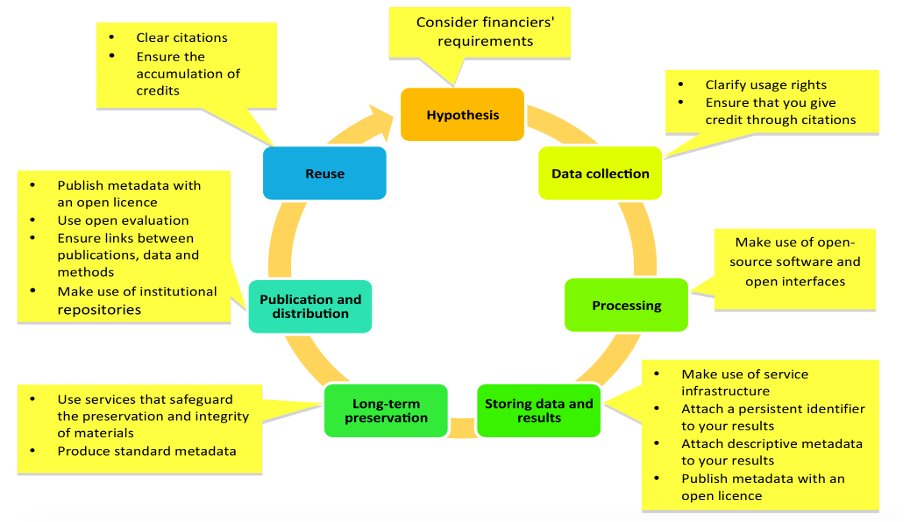UKRI describe Open Research (also referred to as Open Science) as follows:
Open research, also widely referred to as open science, relates to how research is performed and how knowledge is shared based on the principle that research should be as open as possible. It also enables research to take advantage of digital technology.
Transparency, openness, verification and reproducibility are important features of research and innovation. Open research helps to support and uphold these features across the whole lifecycle of research – improving public value, research integrity, re-use and innovation.
The diagram below shows how at each stage of the cycle, open processes can be built in to enhance the research process and share its outcomes widely.

Figure 1. The research lifecycle. From “The Open Science Handbook” (Open Science and Research Initiative, 2014). Used under the Creative Commons Attribution 4.0 International Public License.
Some of the distinct elements of open research are Pre-registration of research, Open Data, Open source code/software, Open lab notebooks/processes, Open peer review , Open Access, Preprints, Publishing of negative results, Citizen Science, Open Educational resources, and persistent identifiers (PIDs) such as ORCiD (Open Researcher and Contributor ID) which enable research systems to interoperate. These Open Research processes are as important as ensuring that the outputs of your research are also open (ie Open Access outputs and Open Research Data). PGR supervisors and Research team leaders should be aware of their responsibility to ensure their students and research teams are aware of open research principles and requirements.
It is recognised that it may not be appropriate to undertake all such activities with every type of research, especially non-publicly funded research, where there may be IP issues, or research involving sensitive data of various kinds, where GDPR legislation or trusted research principles may apply. There is also a need to take a proportional approach to what is published; for example, it may be more appropriate to make algorithms or software open source rather than a full suite of data resulting from them if this would adequately support reproducibility concerns.
Furthermore, we acknowledge that open research approaches and techniques may add to the burden of the research process, and the University is working to support better the delivery of Open Research – see Resources and Support sections. If you have any suggestions for improvement, please use the Open Research email address to comment.
Funders and learned societies have widely embraced the principles of Open Research/Open Science - you can view their policies here.
Researchers should ensure they are aware of these expectations when determining how open an approach they intend in relation to specific projects.